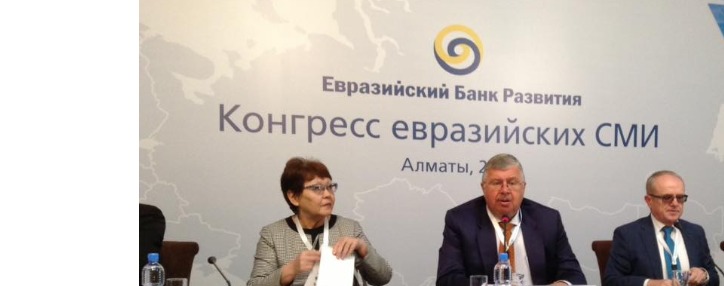EEU’S integration agenda not exhausted yet
06.09.2018,
12:37
The integration agenda of the Eurasian Economic Union (EEU) has not been exhausted and the subsequent activity will be very rich, Sergei Shukhno, Director of the Development Department of the Eurasian Economic Commission (EEC), said at the Eurasian Media Congress in Almaty on Thursday.

ALMATY, September 6. /ARKA/. The integration agenda of the Eurasian Economic Union (EEU) has not been exhausted and the subsequent activity will be very rich, Sergei Shukhno, Director of the Development Department of the Eurasian Economic Commission (EEC), said at the Eurasian Media Congress in Almaty on Thursday.
According to him, over three and a half years of the EEU considerable work has been done - first of all an institutional basis has been created, including the Eurasian Economic Commission, which adheres to transnational interests and many substantive issues have been solved.
He recalled that the EEU was created to realize four freedoms - the free movement of goods, services, capital and labor, and much has been done for each of these directions.
"We can state that the commodity market operates well, except for some exceptions. There are the single customs tariff, the single Customs Code, single oversight standards are applied, which allowed the launch of a single market in the pharmaceutical sector, » said Shukhno.
At the same time, he noted that the integration agenda has not been exhausted; in particular, there are plans to create unified markets in the fields of electricity, gas, oil and oil products, coordinate policies in key sectors of the economy.
"The main task is to determine the further trajectory of the development of the Eurasian integration in view of modern realities," Shukhno said. At the same time, he pointed out the need to expand the powers of EEC for effective implementation of the treaty.
The Eurasian Media Congress, organized by the EDB, is taking place near Almaty on September 5-8. About 60 representatives of the leading media from the EDB member states have gathered for the event.
The plenary session is devoted to the coordination of macroeconomic policy, the use of national currencies in mutual settlements, as well as to the investment interaction of the EDB countries and the role of development institutions in EEU.
A number of panel discussions are also planned to discuss the development of the partnership between the EEU and other integration blocs.
The Eurasian Development Bank (EDB) is an international financial institution established by Russia and Kazakhstan in January 2006 to promote development of the market economy of the participating countries, their sustainable economic growth and the expansion of mutual trade and economic ties. The authorized capital of the EDB is $7 billion. The participating states are Armenia, Belarus, Kazakhstan, Kyrgyzstan, Russia and Tajikistan. --0--
According to him, over three and a half years of the EEU considerable work has been done - first of all an institutional basis has been created, including the Eurasian Economic Commission, which adheres to transnational interests and many substantive issues have been solved.
He recalled that the EEU was created to realize four freedoms - the free movement of goods, services, capital and labor, and much has been done for each of these directions.
"We can state that the commodity market operates well, except for some exceptions. There are the single customs tariff, the single Customs Code, single oversight standards are applied, which allowed the launch of a single market in the pharmaceutical sector, » said Shukhno.
At the same time, he noted that the integration agenda has not been exhausted; in particular, there are plans to create unified markets in the fields of electricity, gas, oil and oil products, coordinate policies in key sectors of the economy.
"The main task is to determine the further trajectory of the development of the Eurasian integration in view of modern realities," Shukhno said. At the same time, he pointed out the need to expand the powers of EEC for effective implementation of the treaty.
The Eurasian Media Congress, organized by the EDB, is taking place near Almaty on September 5-8. About 60 representatives of the leading media from the EDB member states have gathered for the event.
The plenary session is devoted to the coordination of macroeconomic policy, the use of national currencies in mutual settlements, as well as to the investment interaction of the EDB countries and the role of development institutions in EEU.
A number of panel discussions are also planned to discuss the development of the partnership between the EEU and other integration blocs.
The Eurasian Development Bank (EDB) is an international financial institution established by Russia and Kazakhstan in January 2006 to promote development of the market economy of the participating countries, their sustainable economic growth and the expansion of mutual trade and economic ties. The authorized capital of the EDB is $7 billion. The participating states are Armenia, Belarus, Kazakhstan, Kyrgyzstan, Russia and Tajikistan. --0--



